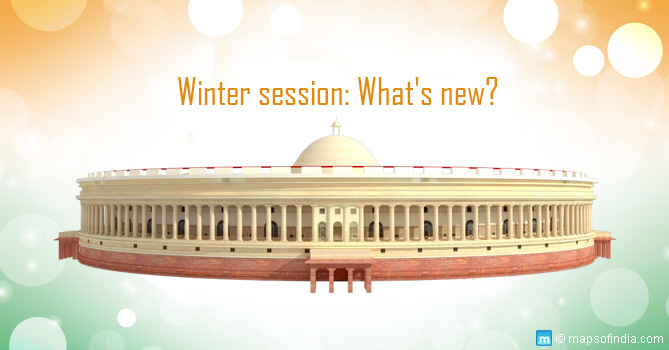The winter session began on the Constitution Day of India, i.e., 26 November 2015. On the eve of winter session, Finance Minister Arun Jaitley spoke about the constitution and talked about some articles drafted by Dr .B.R. Ambedkar. He also said that a mere statement on television is condemned as intolerance. During the ongoing winter session, there are a lot of expectations from the Parliament over discussions of national issues and many pending bills.
What are the issues likely to be discussed in the session?
The opposition is expected to bring the topic of intolerance for discussion. The issues like Dadri killings and return of awards are likely to be raised too. In recent times, ‘intolerance’ has been a topic of discussion every where in the country. Moreover, the writers and other renowned personalities are returning their awards given by the government, saying that the country is becoming intolerant day-by-day and ‘freedom of speech and expression’ has been affected. While discussing about the architect of the Constitution, Dr. B. R. Ambedkar, the Opposition may also raise the issue of the word ‘secularism’ given in the Constitution. The ruling side may argue that secularism has been misused and the entire episode of ‘intolerance’ might be a ‘fabricated campaign’ to defame the government, especially at the time of Bihar elections.
Which pending bills may be passed in the session?
There are as many as 20 bills for consideration and lined-up to be passed in the Parliament. These include the Constitutional Amendment Bill to enable the Goods and Services Tax (GST), the Electricity (Amendment) Bill, the Child Labour (Prohibition and Regulation) Amendment Bill; the Real Estate (Regulation and Development) Bill; the Whistle Blowers Protection (Amendment) Bill, the Juvenile Justice (Care and Protection of Children) Bill; and the Prevention of Corruption (Amendment) Bill.
Some of these bills are discussed below.
- The Constitutional Amendment Bill is the much-awaited bill to put together the indirect taxes under one head – the Good and Service Tax (GST). If this bill is passed, both the central and state government will have the power to create laws related to GST.
- The Electricity Bill, if passed, will prove to be a major move towards the greater competition in the sector. If the bill is passed, it would result in the supply companies in a geographical area to compete with each other to offer improved services and low tariffs to the customers.
- The Real Estate Regulation Bill, if passed, will regulate the transactions that took place between residential property developers and buyers.
- Juvenile Justice Bill, which has been passed by the Lok Sabha, seeks to reduce the age of a juvenile from 18 years to 16 years, and be treated as an adult, in case of heinous crimes.
- The Child Labour Act, if passed, will prohibit children under the age of 14 years to be employed in any sort of occupation, except for helping the family after school hours.
- Much need act, Prevention of Corruption Act, is also lying pending for the approval.
- Whistle Blowers Protection Act will be amended to protect people from making disclosures related to corruption.
- High Court and Supreme Court Judges (Salaries and Conditions of Service Amendment Bill, 2015), seeks to bring changes in the salary, pension and leave allowances of the judges.
- High Courts (Alteration of Names) Bill will “facilitate changing the names of the High Courts in case the need arises.
- The National Commission for Women Bill will adequately protect the rights of women.
- If the ordinances for Negotiable Instruments (Second Amendment) Ordinance, Arbitration and Conciliation Amendment Ordinance, and the Commercial Courts Ordinances, will not pass in the winter session, they will be lapsed.
When will the wait be over?
As the winter session has commenced, things will become clear only after the proceedings of the session in both the houses – Lok Sabha and Rajya Sabha. The ruling and the opposition parties have done their set of preparations to discuss the issues. The monsoon session was not that successful as the opposition was demanding actions to sack MPs Sushma Swaraj and Vasundhra Raje to be associated with Lalit Modi’s controversy. Hopefully, in the winter session, both the ruling government and the opposition will work together to sought out the matters for the development of the country.




